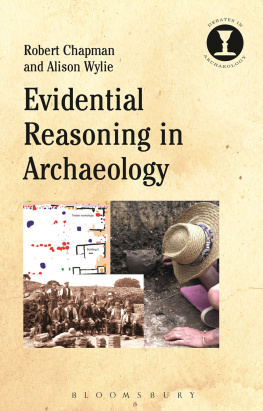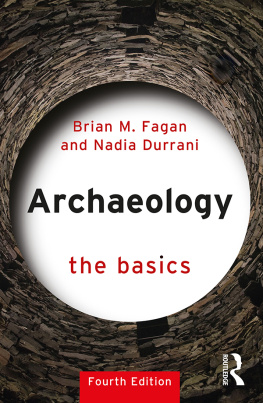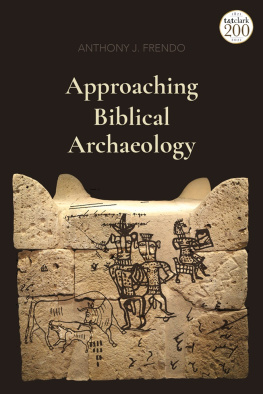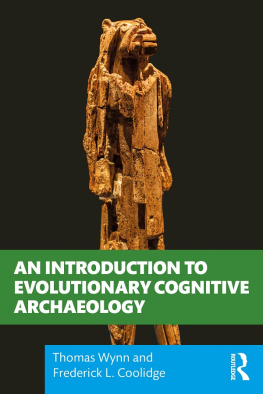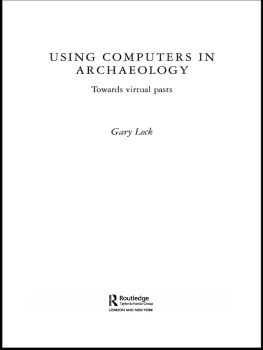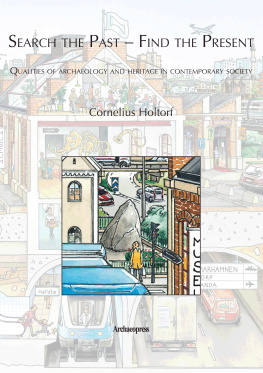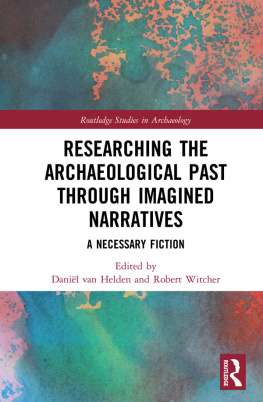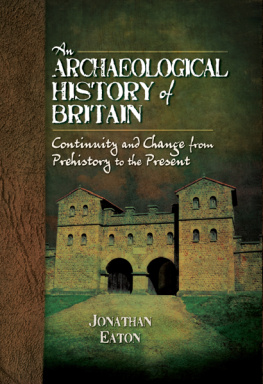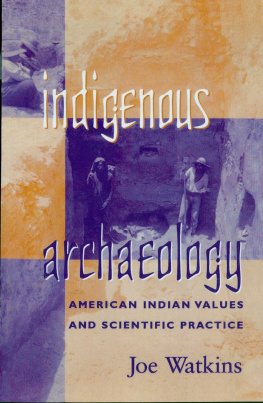Evidential Reasoning
in Archaeology
Debates in Archaeology
Series editor: Richard Hodges
Against Cultural Property, John Carman
The Anthropology of Hunter Gatherers , Vicki Cummings
Archaeologies of Conflict , John Carman
Archaeology: The Conceptual Challenge , Timothy Insoll
Archaeology and International Development in Africa , Colin Breen and Daniel Rhodes
Archaeology and the Pan-European Romanesque , Tadhg OKeeffe
Archaeology and State Theory , Bruce Routledge
Archaeology and Text , John Moreland
Beyond Celts, Germans and Scythians , Peter S. Wells
Building Colonialism , Daniel T. Rhodes
The Byzantine Dark Ages , Michael J. Decker
Combat Archaeology , John Schofield
Debating the Archaeological Heritage , Robin Skeates
Early European Castles , Oliver H. Creighton
Early Islamic Syria , Alan Walmsley
Fishing and Shipwreck Heritage , Sean A. Kingsley
Gerasa and the Decapolis , David Kennedy
Image and Response in Early Europe , Peter S. Wells
Indo-Roman Trade , Roberta Tomber
Loot, Legitimacy and Ownership , Colin Renfrew
Lost Civilization , James L. Boone
The Origins of the Civilization of Angkor , Charles F. W. Higham
The Origins of the English , Catherine Hills
The Remembered Land , Jim Leary
Rethinking Wetland Archaeology , Robert Van de Noort and Aidan OSullivan
The Roman Countryside , Stephen Dyson
Roman Reflections , Klavs Randsborg
Shaky Ground , Elizabeth Marlowe
Shipwreck Archaeology of the Holy Land , Sean Kingsley
Social Evolution , Mark Pluciennik
State Formation in Early China , Li Liu and Xingcan Chen
Towns and Trade in the Age of Charlemagne , Richard Hodges
Vessels of Influence: China and the Birth of Porcelain in Medieval and Early Modern Japan , Nicole Coolidge Rousmaniere
Villa to Village , Riccardo Francovich and Richard Hodges
Evidential Reasoning
in Archaeology
Robert Chapman and Alison Wylie
Bloomsbury Academic
An imprint of Bloomsbury Publishing Plc
Contents
Table
Figures
All artwork created by the authors.
The planning for this book and for its companion, the edited volume Material Evidence: Learning from Archaeological Practice (Routledge, 2015), began in 2010, when a grant from the Leverhulme Trust, sponsored by Bob Chapman, made it possible for Alison Wylie to spend six months as a Visiting Professor in the Department of Archaeology at the University of Reading (UK). We thank the Leverhulme Trust and the staff and postgraduate students of the Department of Archaeology for their support, as well as the University of Washington for granting the leave that made this extended visit at Reading possible.
We also thank colleagues in the many departments of Archaeology and of Philosophy in the UK who hosted Leverhulme lectures and seminars in 2010, and the colleagues who participated in a workshop on Material Culture as Evidence that we convened in Reading in June 2010. This workshop was made possible by generous support from the Leverhulme Trust and the then School of Human and Environmental Sciences at the University of Reading. The feedback on these lectures, and the discussions generated by the workshop and a seminar series on evidential reasoning that we convened in the Department of Archaeology at the University of Reading, were crucial to shaping our vision for these two collaborative evidence projects: Material Evidence and now Evidential Reasoning in Archaeology. We especially thank Richard Bradley, Mike Fulford and Gundula Mldner for presentations in the Reading seminars, and all the contributors to the Reading workshop and to Material Evidence for incisive analyses and inspiring examples of archaeology-in-practice that pushed our thinking about evidential reasoning in more ways than we can credit. Alison Wylie thanks, as well, her Archaeology colleagues at the University of Washington for a vigorous and enormously helpful discussion of a FAALS presentation she gave on the Leverhulme Evidence project when she returned from Reading (Friday Afternoon Archaeology Lecture Series), and her CHESS (Centre for Humanities Engaging Science and Society) colleagues at the University of Durham for rigorous debate about robustness reasoning and the inspiring example they set as philosophers of science actively engaged with science practice and policy.
In the course of writing this book we realized that we were not alone in our frustration with the positions and debates we characterize as dead ends in thinking about evidential reasoning, and that many of our intuitions about more promising alternatives had been articulated by intellectual forebears who, to varying degrees, have been read out of our respective disciplinary canons. On the archaeology side, we have been particularly influenced by David Clarkes advocacy in 1973 for building an internal philosophy of archaeology, and inspired by the example he sets for integrating philosophical reflection into research practice. And on the philosophy side, we found in Stephen E. Toulmins brief for attending to the Uses of Argument (1958) an articulation of a philosophical stance that anticipates by several decades the pragmatic turn we hope is successfully embodied in our case-grounded analyses of evidential reasoning in archaeology.
Finally, we thank Martin Bell for suggesting we submit this book to the Duckworth Debates in Archaeology series, the series editor Richard Hodges for his enthusiastic support, Richard Bradley for reading and offering constructive comments on drafts of , and Sarah Lambert-Gates and Rory Falconer for preparing the illustrations. Charlotte Loveridge and Alice Wright at Bloomsbury gave us encouragement and showed considerable patience with our several delays to the books completion. Any errors or omissions are our fault.
The allure of archaeology is, for many, the thrill of an encounter with tangible traces of a human past irrevocably beyond reach, but somehow made present with an intensely compelling immediacy. A compendium of Wonders of the Past dating to the 1920s, brimming with enthusiasm for discoveries of the previous century, trades on just this sense that, whether these traces are grand monuments and ancient art or the surviving fragments of daily craft production, they put us in uniquely direct contact with the past. In the absence of the actual ruins and artefacts, lavish illustrations promise to convey what archaeology has to teach better than descriptions could do:
They are visible evidence of the cultures and civilisations which have passed away, of the marvellous achievements of human genius and art which have been ruthlessly mutilated or destroyed. They enable us to see once more a fragment of what civilised man has achieved in earlier ages and in other lands, to lift the veil that hangs over his life and mental powers in the distant past. (Sayce 1923/33: 9)
Narratives of discovery convey the power, and sometimes the shock, of material confrontation with the past in particularly vivid terms. Perhaps the most famous of these is the romantic story of Schliemanns great discovery at Troy in 1873: working alone with his young Greek wife, Sofia, to forestall the risk of thievery, the pair brushed the dirt from gold vessels and diadems, exulting in the momentous discovery of the great Trojan treasure, Priams hoard (Klejn 1999: 110, 115). Evidently the hoard itself was assembled from a number of different sources, and the story of its discovery a blatant fabrication a florid archaeological fantasy (Gere 2009: 234) but at the time it immediately captured public imagination as tangible evidence that Schliemann had located the famous city of Homeric legend.

